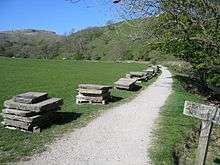Yorkstone
Yorkstone or York stone is a variety of sandstone, specifically from quarries in Yorkshire that have been worked since mediaeval times.[1] Yorkstone is a tight grained, Carboniferous sedimentary rock. The stone consists of quartz, mica, feldspar, clay and iron oxides.

Known for its hard-wearing and durable qualities, Yorkstone has been used in a wide array of building, construction and landscaping applications around the world for many years. In Yorkshire, split stones called thackstone (Scots thack, English thatch) were employed as roofing. The traditional London paving stone has been cut and pressed from quarries in Holmfirth, West Yorkshire. Yorkshire Stone is most commonly used for paving and garden walls, but it is also a popular choice for new builds as well as home extensions and conversions due to its durability to harsh weather conditions.[2]
The colour of Yorkstone depends on the minerals within its makeup and differs throughout the quarries from which it is mined. It also depends on the age of the stone and turns darker with weathering. Newly quarried Yorkstone is available as slabs for paving, setts and walling stones. It is also available to buy from stone masons as a custom-shaped product such as signage.[3].
Reused Yorkstone paving, salvaged from demolished sites, is valued for its naturally weathered surfaces. Both old and new Yorkshire Stone can be used for paving and building alike. Reclaimed yorkshire stone is becoming more popular for its colouring and also for environmentally friendly builds. Most stone companies in Yorkshire will cut the stone to 140mm walling size and offer a colour matching service for home extension projects.[4]
See also
References
- Gould, Kate (29 February 2012). "Designing small gardens: choosing stones". The Guardian. Retrieved 9 April 2014.
- https://www.theyorkshirestonecompany.co.uk/yorkstone/
- http://www.glmstonesales.co.uk/stone-house-name-signs/
- https://www.theyorkshirestonecompany.co.uk/yorkstone/